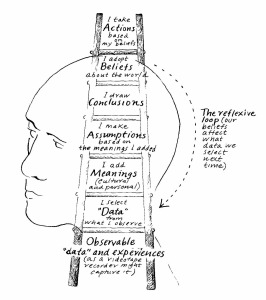 This past week, the Coaching team at Church Community Builder was brushing up on the Ladder of Inference. The Ladder is a concept that describes how humans make conclusions about our world. For a quick intro, I love this video from Trevor Maber. Recognizing the concept of the Ladder can be helpful in understanding how you or others think, but what about “short circuiting the ladder” as Trevor mentions in the video? I find the best way to diagnose and change your own inferences is to practice asking “How Come?”.
This past week, the Coaching team at Church Community Builder was brushing up on the Ladder of Inference. The Ladder is a concept that describes how humans make conclusions about our world. For a quick intro, I love this video from Trevor Maber. Recognizing the concept of the Ladder can be helpful in understanding how you or others think, but what about “short circuiting the ladder” as Trevor mentions in the video? I find the best way to diagnose and change your own inferences is to practice asking “How Come?”.
How Come
How did I come to this conclusion? In linguistics we learn that words often elicit specific responses. In this context, the word How elicits a process response in our brain. That is helpful because we want to know the process (the Ladder) I used in getting to my latest opinion, feeling, conclusion, or action. To take the time and think through what led me here can open the door to self awareness. I recommend asking your self How Come several times in sequence and just pay attention to the response you get (from yourself). In fairness, this might be best done in private the first few times or you can raise some eyebrows while talking to yourself.
The other day, I was irritated with my mechanic. I had taken my truck in for service and the result was a large bill, larger than I could afford. At the top of the ladder, I concluded they were an unethical bunch. So, I asked, “How did I get to that conclusion?” With several cycles of that question, I was able to find these Ladders at work:
- He is unethical. (so, How Come I got there…)
- He is out to get me, and my money. (so, How Come I got there…)
- He is recommending some preventive services I don’t think I need. (so, How Come I got there…)
- I can’t afford this stuff…money is really tight right now.
- I just never seem to get ahead.
- I wish I hadn’t spent so much money earlier this year.
- I have really failed at managing our money.
- …and on and on.
Notice here that the top of the Ladder is an attribution about the other guy and his character. Then, as I start to work down my Ladder, that character flaw is reframed to be more about the situation, then eventually about me and my character. The bottom line is I know my mechanic is ethical and trustworthy, and he just touched a nerve in me that triggered my Ladder.
As a result of working myself down the Ladder, I was able to come to a very different opinion about his recommendation, and feel much better about the interaction.
Why not Why
There is a temptation to replace How Come with Why. I would caution against that. Again, back to linguistics. The question Why tends to elicit defensive postures. “Why did you do that?” “Well, because I felt like it.” Recognize the emotional difference if you ask your self, “How did you get to that conclusion?” vs. “Why did you do that?”
Maybe it is just me, and I feel better with explaining the process rather than defending the position.
Your Next Move
Next time you notice you are making a conclusion about the world around you, ask How Come. This is particularly powerful when you are making a judgement about another person. From the video, think of that other driver, the jerk. Talk yourself down the Ladder and give that other person a chance to reveal some extra data.

Spot on with this write-up, I absolutely think this website needs a lot more attention. I’ll probably be returning to read through more, thanks for the info!
This web site definitely has all of the information and facts I wanted concerning this subject and didn’t know who to ask.
Patricia – I am glad you liked it. While the blog doesn’t really have a theme, I expect a lot of commentary on what makes us effective as leaders, and as humans.
Enjoy!